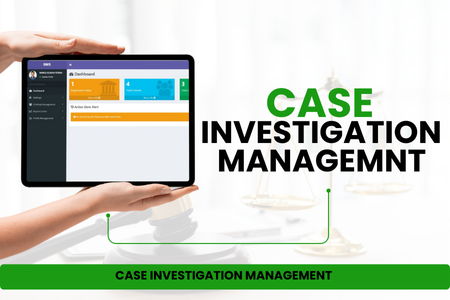Case Investigation Management Documentation!
Managing criminal investigations requires a structured approach to ensure accuracy, transparency, and legal compliance. Case Investigation Management is a crucial system that helps law enforcement agencies track, document, and resolve cases efficiently.
Websofy Software Pvt. Ltd., the best software development company in Lucknow, has designed an advanced Case Investigation Management software to simplify police case handling. This powerful tool streamlines evidence collection, witness management, and legal documentation, making investigations more efficient.

This guide covers how the Case Investigation Management software enhances criminal case tracking, documentation, and security.
Features of the Case Investigation Management
1. Case File Creation
The first step in an investigation is creating a structured case file that includes:
- Case Number: A unique identifier for tracking.
- Date Opened: The official start date of the investigation.
- Case Title: A short description of the crime (e.g., robbery, fraud, assault).
- Investigator Details: Names and designations of officers handling the case.
- Victim & Suspect Information: Personal details, addresses, and related information.
- Date Reported: When the case was officially filed.
A well-maintained case file ensures organized record-keeping, crucial for evidence presentation in court.
2. Incident Report and Witness Testimonies
An investigation begins with a detailed Incident Report, which includes:
- Crime Details: Type, location, time, and circumstances of the event.
- Witness Statements: Recorded testimonies that can validate evidence.
- Suspect Statements: Any confessions or accounts given by the suspect.
The accuracy of incident reports plays a vital role in criminal proceedings and legal documentation.
3. Case Investigation Log
A proper Investigation Log helps track every step taken in the case, such as:
- Case Activity Logs: Interviews, follow-ups, and searches.
- Status Updates: Ongoing changes, including new leads or evidence.
- Legal Documentation: Search warrants, arrest authorizations, and case progress reports.
A structured log ensures every detail is documented for legal reference.
4. Evidence Collection & Management
One of the most critical aspects of Case Investigation Management is handling evidence correctly. It involves:
- Chain of Custody: Maintaining records of who accessed the evidence.
- Forensic Reports: Expert analysis of DNA, fingerprints, ballistics, etc.
- Physical & Digital Evidence: Weapons, documents, videos, and digital footprints.
Proper evidence handling strengthens legal cases and ensures justice.
5. Interviews and Interrogations
Conducting effective interviews and interrogations is key to gathering reliable information. This includes:
- Interview Records: Statements from victims and witnesses.
- Interrogation Reports: Suspect questioning and recorded confessions.
Following ethical and legal procedures in interrogations prevents forced confessions and ensures credibility.
6. Legal Documentation and Court Proceedings
To move forward with prosecution, law enforcement agencies must prepare:
- Charging Documents: Official records stating the charges.
- Court Orders: Subpoenas and search warrants.
- Case Disposition Reports: Final outcomes, including convictions or acquittals.
Accurate documentation ensures smooth case progression in the legal system.
7. Case Closure and Review
Once an investigation concludes, proper documentation is required for closure. This includes:
- Reason for Closure: Case solved, suspect arrested, or lack of evidence.
- Final Report: A summary of findings and legal actions taken.
- Internal Review: Evaluations to improve investigation practices.
Thorough reviews help refine law enforcement procedures for future cases.
8. Confidentiality and Data Security
Maintaining data security is essential in Case Investigation Management. It involves:
- Access Control: Restricting case file access to authorized personnel.
- Data Protection Laws: Ensuring compliance with privacy regulations.
- Retention & Disposal Policies: Managing case file storage and secure disposal.
Strict confidentiality safeguards sensitive information and ensures legal compliance.
9. Use of Technology in Case Management
Modern law enforcement agencies use case management software for:
- Digital Case Tracking: Managing tasks, deadlines, and reports.
- Evidence Storage: Securely handling forensic and digital evidence.
- Automated Alerts: Notifying investigators of important case updates.
Technology streamlines case handling, reducing manual errors and improving efficiency.
10. Continuous Improvement & Quality Control
Regular audits and quality checks are crucial to improving investigative procedures. Key practices include:
- Internal Case Audits: Ensuring compliance with legal standards.
- Training & Policy Updates: Enhancing officers’ skills in case handling.
- Data-Driven Analysis: Identifying patterns to prevent recurring crimes.
A commitment to continuous improvement strengthens criminal justice processes.
Conclusion
Effective Case Investigation Management ensures law enforcement agencies can conduct thorough, transparent, and legally compliant investigations. By implementing structured documentation, evidence tracking, and secure data management, agencies can enhance their ability to solve crimes efficiently.
For organizations seeking an advanced Case Investigation Management system, integrating digital tools and forensic analysis can significantly improve investigative efficiency and legal compliance.
Do you need any IT help?
Efficiently customize just in time communities via user friendly customer service. Dramatically optimize empowered mindshare done.



